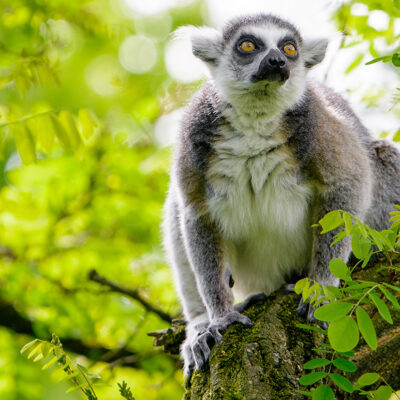Poaching Lemurs

Lemurs are sometimes killed for food and because of cultural beliefs, and are taken from the wild for the pet trade
Although it’s illegal, lemurs are hunted and taken from the wild in Madagascar for food, for the pet trade, and sometimes because of cultural beliefs.
If lemurs were not so endangered, this wouldn’t be as high a concern. But, with 31% of species critically endangered, or one step away from extinction in the wild, each individual lemur is important to ensure the survival of the species.
Hunted for Food
Madagascar has one of the world’s most vulnerable economies. Many people across the island struggle to provide food for their families. For this reason, some Malagasy people will hunt wild lemurs for food. Sometimes, people capture wild lemurs and keep them as food reserves to be used when food is especially scarce. And, lemurs are also poached for underground restaurants to serve international visitors and wealthier local people.
Conservation solutions that support Malagasy people and help bring them out of poverty are key to protecting Madagascar’s endangered species.
Poaching lemurs because of Cultural Beliefs, or Fady
Malagasy people have complex cultural beliefs, called fady. These beliefs vary widely across Madagascar and can even be different from village to village in the same region. For example, in some areas, aye-ayes are killed because they are considered a bad omen. But in other areas, it is actually taboo to kill aye-ayes. Recent research by Randimbiharinirina et al. (2021) found that while the aye-aye is seen as a bad omen by most villages in northeastern Madagascar, it is not always killed and some people even view the animal positively because it helps reduce crop pests.
Poaching Lemurs from the Wild for the Pet Trade
It is illegal to have lemurs as pets in Madagascar. But, some hotels, restaurants, and personal households still keep lemurs that were taken from the wild as pets. At hotels and restaurants, they are often kept to attract tourists who want an up close and personal lemur experience.
The pet trade harms individual lemurs because their social, behavioral, and food needs cannot be met in the unnatural setting of a home, hotel, or restaurant. Additionally, it harms the conservation of lemur species because if there are less lemurs in the wild, then there are less lemurs that can reproduce and maintain the species.
Visit petlemur.com for the latest research on the lemur pet trade. Support the rehabilitation of lemurs that have been confiscated from the illegal trade in Madagascar by donating to Lemur Love, the Lemur Rescue Center, and the Madagascar Fauna and Flora Group.
Think Before you Take or Share a Lemur Selfie
Research shows that sharing lemur selfies online increases people’s desire to have a lemur as a pet. So, think twice before you take or share a selfie with a lemur, whether you are at a zoo or elsewhere.
While having a lemur as a pet is unfortunately legal in some places around the world, it is illegal in Madagascar. So, when Malagasy people see photos online of foreigners petting a lemur or with a lemur on their shoulder, it is upsetting. There is little context to photos online, so people living in Madagascar may not know that the photo was taken at an accredited zoo or even that the person holding the lemur in the photo is a zookeeper. What they see is a foreigner who is allowed to pet and hold a lemur, even though that is illegal in Madagascar. Sometimes, this can make Malagasy people more likely to want to have a lemur as a pet in Madagascar. Pet lemurs in Madagascar are taken from the wild. So that means your lemur selfie may directly impact the number of lemurs left in the wild.
Take photos of lemurs by themselves, or with the lemur at least 8 feet away from any people in the photo.
